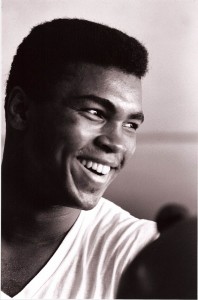When I Met Muhammad Ali

The smile.
In 1968 or 69, when I worked on the student newspaper at the University of Delaware (UD), I drew an assignment to interview Muhammad Ali. I was a fairly random choice since I didn’t cover sports. But the angle of the story was Viet Nam and the antiwar movement. Since I wrote about politics, I volunteered eagerly to meet the man behind the legend.
At the time, Ali was in his three-and-a-half year exile from boxing. In 1967, Ali had refused to be drafted in the army and filed for conscientious objector status. He also made the memorable statement, “I ain’t got no quarrel with the Viet Cong. No Viet Cong ever called me nigger.” His political positions coupled with his fame made him one of the most polarizing figures of American history. Boxing commissions stripped him of his title and no state would grant him a license to fight. (The Supreme Court later unanimously granted him conscientious objector status and he resumed his boxing career).
My assignment was straightforward. Ali was on a speaking tour of college campuses and was preparing to give a speech at Delaware State University. I was to drive to DSU and, with a dozen or so other journalists, spend an hour interviewing him. The fact that Ali was speaking at DSU, instead of UD, was telling. Though the state of Delaware was a not “southern”, its educational system was highly segregated. The University of Delaware was for white students; Delaware State was for black students. Indeed, Delaware State was founded in 1891 as the State College for Colored Students. Perhaps for obvious reasons, Ali chose to speak at Delaware State.
Ali was a member of the Nation of Islam, often referred to as Black Muslims. (He later converted to mainstream Islam). At the time, the Nation of Islam advocated the separation of races and viewed “white devils” as an inferior race created by an evil scientist. On judgment day, white people would be destroyed.
I had followed Ali’s career closely and knew something about his strength and speed. It’s a little known fact that I boxed in the Golden Glove preliminaries in high school. I wanted to box like Ali. I knew that we were both the same height – 6 foot 3. His reach was 78 inches. So was mine. He was fast. So was I. The difference: he weighed 215 pounds and was athletic. I weighed 160 pounds and was nerdy. I could float like a butterfly but my sting was like a damp Kleenex.
I found my way to the right building on the Delaware Sate campus. The meeting room was just down the hall and around the corner. I rounded the corner and practically tripped over Muhammad Ali.
I wasn’t prepared and didn’t know what to expect. I was eager to meet him but also nervous. He was the most famous person I ever met (still true today). But perhaps he wouldn’t be happy to see me. Perhaps he would deem me a white devil and ban me from his presence. But, in fact, he was one of the most gracious people I have ever met. I was stammering awkwardly and he had no particular reason to be nice to me but he welcomed me warmly and offered me a hand that seemed twice as large as mine.
Since we were the same height, I assumed that I could look him in the eye. But no – he seemed so much bigger than I was. I don’t know where charisma comes from but he had it in vast quantities. He was far more charismatic than Bill Clinton, whom I met many years later. Ali seemed to float in the air in front of me.
I’ve just read several obituaries of Muhammad Ali. They discuss his athletic prowess, his political views, his religious development, and, course, his verbal jousting. What I saw was a thoughtful, caring, magnetic individual who invited me into his world for about an hour.
During the press round table, I know I asked some questions, but I don’t remember them. I know I wrote an article, but I don’t remember it. What the obituaries don’t mention was his smile. It was magnanimous and all encompassing. That’s what I’ll remember.
That’s a really interesting article Travis – I’d never thought of Muhammad Ali as that sort of person. It was a sad loss of a great man.
Thank you for this.